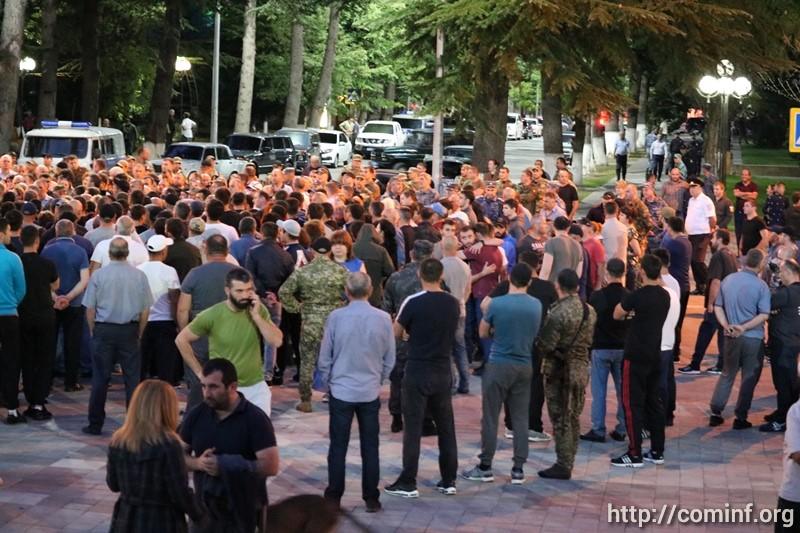South Ossetia’s Chief Prosecutor has mounted an offensive against the opposition as the region’s legislature heads towards paralysis.
Embattled Chief Prosecutor Uruzmag Dzhagayev, who is currently embroiled in a scandal over the death in custody of a local man, has accused four opposition parliamentarians of a variety of crimes.
Dzhagayev announced the allegations hours after 17 of 34 MPs vowed on 1 September to ‘prevent parliament from operating’ unless President Anatoly Bibilov fire and investigate him, along with recently dismissed Interior Minister Igor Naniyev, for abuse of power.
In a written address to the president, the MPs insisted that an impartial investigation into allegations of mistreatment of detainees would be impossible as long as Dzhagayev remained Chief Prosecutor.
On 29 August, 23 MPs supported a no-confidence vote against Dzhagayev. Bibilov now faces an 8 September deadline to formally respond to the vote.
Protests erupted in the South Ossetian capital Tskhinvali (Tskhinval) on 28 August after photos emerged of the bruised body of 30-year-old local resident Inal Dzhabiyev. The scandal has so far led to the dismissal of the government.

Dzhabiyev was accused of an attempt on the life of Interior Minister Igor Naniyev on 17 August, a case still under investigation under the Chief Prosecutor’s Office.
Another suspect in the case, Nikolay Tskhovrebov, was also hospitalised after his arrest.
On 31 August, South Ossetian Human Rights Commissioner Inal Tasoyev confirmed to state-run news agency Res that both men were tortured.
[Read more on OC Media: Crisis deepens in South Ossetia as MPs threaten to shut down parliament]
Allegations against opposition MPs
On 1 September, the Chief Prosecutor announced he had requested the Supreme Court strip the parliamentary immunity of four of the 17 MPs who threatened to paralyse the legislature.
The Cheif Prosecutor’s Office has accused People’s Party leader Aleksandr Pliyev, who serves as Deputy Speaker of Parliament, of forging medical documents while working as an intensive care physician in a hospital in Tskhinvali in 2005.

Nykhas Party leader David Sanakoyev was accused of defaming the Chair of the Supreme Court last year.
Dzhambulat Medoyev, a People’s Party MP, was accused of helping a criminal wanted for a ‘number of grave and especially grave crimes’ to flee the authorities in 2018–2019.
The most serious accusation was levelled against Alan Gagloyev, an MP from Nykhas, and his brother Aleksandr Gagloyev, whom Dzhagayev implicated in a triple murder from 16 years ago.
The Chief Prosecutor claimed that in June, the authorities had discovered the bodies of three Russian nationals who were kidnapped and executed in 2004.
He also accused the MPs in question of ‘using the popular masses, calling on them to topple legitimately elected authorities in the Republic’ in order to ‘achieve their personal goals’.
He added that he would resign only if all four MPs stepped down.
Bibilov’s response
Protests were held in central Tskhinvali from 28–31 August. However, on 1 September, the authorities announced that the central Theatre Square would be closed off from 3 September to prepare for commemorations of the Beslan Tragedy, a terrorist attack on a school in the North Ossetian town in 2004.
The announcement came a day after President Bibilov refused to meet street protesters outside his office.
Bibilov has also remained silent on demands for his resignation after promising last Friday he would step down if he did not receive support in a ‘plebiscite’.
South Ossetia remains without a government following their dismissal on 29 August. The president will require the support of a majority of MPs to appoint a new government.
In June 2019, the ruling United Ossetia party won only 14 out of 34 seats in the seventh convocation of South Ossetia’s Parliament, a significant drop since winning 20 seats in 2014.
For ease of reading, we choose not to use qualifiers such as ‘de facto’, ‘unrecognised’, or ‘partially recognised’ when discussing institutions or political positions within Abkhazia, Nagorno-Karabakh, and South Ossetia. This does not imply a position on their status.




 3 September 2020
3 September 2020



